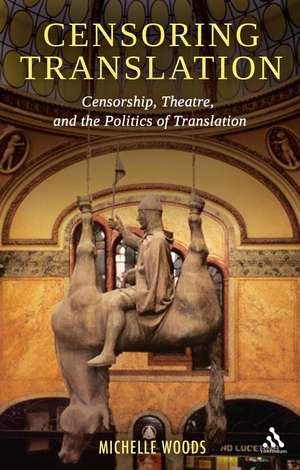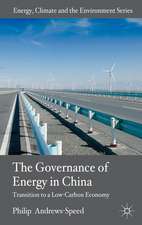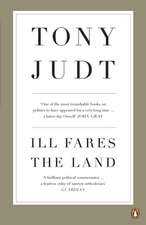Censoring Translation: Censorship, Theatre, and the Politics of Translation
Autor Dr. Michelle Woodsen Limba Engleză Paperback – 11 iul 2012
| Toate formatele și edițiile | Preț | Express |
|---|---|---|
| Paperback (1) | 237.28 lei 43-57 zile | |
| Bloomsbury Publishing – 11 iul 2012 | 237.28 lei 43-57 zile | |
| Hardback (1) | 714.19 lei 43-57 zile | |
| Bloomsbury Publishing – 11 iul 2012 | 714.19 lei 43-57 zile |
Preț: 237.28 lei
Preț vechi: 319.61 lei
-26% Nou
Puncte Express: 356
Preț estimativ în valută:
45.42€ • 49.35$ • 38.18£
45.42€ • 49.35$ • 38.18£
Carte tipărită la comandă
Livrare economică 21 aprilie-05 mai
Preluare comenzi: 021 569.72.76
Specificații
ISBN-13: 9781441100573
ISBN-10: 1441100571
Pagini: 200
Dimensiuni: 138 x 216 x 15 mm
Greutate: 0.34 kg
Ediția:New.
Editura: Bloomsbury Publishing
Colecția Continuum
Locul publicării:New York, United States
ISBN-10: 1441100571
Pagini: 200
Dimensiuni: 138 x 216 x 15 mm
Greutate: 0.34 kg
Ediția:New.
Editura: Bloomsbury Publishing
Colecția Continuum
Locul publicării:New York, United States
Caracteristici
Uses previously unpublished archive material, including letters by Havel, Stoppard, and Tynan
Notă biografică
Michelle Woods is Assistant Professor of English at The State University of New York, New Paltz, USA. Previously she was Director of the Centre for Translation and Textual Studies at Dublin City University, Republic of Ireland. She is the author of Translating Milan Kundera (2006).
Cuprins
Preface1. Introduction2. Ideological Censorship 3. Gender Censorship 4. Market Censorship Bibliography Index
Recenzii
This book explores how censorship shapes the way we interpret the translation of theatrical performances. . [Woods'] taxonomy of censorship compels the reader to rethink the typical top-down structure of the state twisting the playwright to change his play in order to make the state look good. Woods reads different kinds of censorship with political, gendered, and market translation as the overarching situations in which censorship takes place, while self-censorship and translatorial self-censorship occur within politics, gender, and the market.
Censoring Translation, by Michelle Woods, offers an insightful, provocative, and often amusing investigation of the translation of Vaclav's Havel's plays into English. Woods's sophisticated treatment of the subject moves far beyond the question of overt repression, offering a more complex understanding of censorial power, one that recognizes the enormous influence of market forces, gender, and Cold War politics-on both sides of the Iron Curtain-in shaping the selection of texts for translation, the choice of a translator, and the overall translation approach taken. Woods reveals economic censorship to be often more severe and distorting than the traditional political variety and especially effective in framing and silencing the voices of "minor" nations and of female translators. This book will fundamentally change the way you think about censorship and translation.
This fascinating book traces the complexities of translating and staging the work of one Czech playwright, the late, great Vaclav Havel for English and American audiences. Woods raises important questions about the politics of translation and exposes just how forms of censorship can operate in both totalitarian and commercially-driven environments.
Censoring Translation is a testimony to the vigor of translation studies as the new interdiscipline that emerged in recent decades and has radically changed the ways in which we view translations and translators. As one of the promising scholars of her generation, Michelle Woods gives us a very readable, well-informed, insightful discussion on Vaclav Havel's work as a playwright and the politics involved in the dissemination of his work in the Anglo-American context, with particular emphasis on the fundamental role played by one of his main translators, Vera Blackwell.
This book is an important contribution to research on socio-economic and political constraints on translation, in general, and a thought-provoking, well-informed study on theatre censorship, in particular. Through her incisive comparison of Vaclav Havel's confrontations with official censors in his native Czechoslavakia and the market pressures on English-language translators of his plays, Woods further nuances the critical vocabulary of translation censorship.
Censoring Translation, by Michelle Woods, offers an insightful, provocative, and often amusing investigation of the translation of Vaclav's Havel's plays into English. Woods's sophisticated treatment of the subject moves far beyond the question of overt repression, offering a more complex understanding of censorial power, one that recognizes the enormous influence of market forces, gender, and Cold War politics-on both sides of the Iron Curtain-in shaping the selection of texts for translation, the choice of a translator, and the overall translation approach taken. Woods reveals economic censorship to be often more severe and distorting than the traditional political variety and especially effective in framing and silencing the voices of "minor" nations and of female translators. This book will fundamentally change the way you think about censorship and translation.
This fascinating book traces the complexities of translating and staging the work of one Czech playwright, the late, great Vaclav Havel for English and American audiences. Woods raises important questions about the politics of translation and exposes just how forms of censorship can operate in both totalitarian and commercially-driven environments.
Censoring Translation is a testimony to the vigor of translation studies as the new interdiscipline that emerged in recent decades and has radically changed the ways in which we view translations and translators. As one of the promising scholars of her generation, Michelle Woods gives us a very readable, well-informed, insightful discussion on Vaclav Havel's work as a playwright and the politics involved in the dissemination of his work in the Anglo-American context, with particular emphasis on the fundamental role played by one of his main translators, Vera Blackwell.
This book is an important contribution to research on socio-economic and political constraints on translation, in general, and a thought-provoking, well-informed study on theatre censorship, in particular. Through her incisive comparison of Vaclav Havel's confrontations with official censors in his native Czechoslavakia and the market pressures on English-language translators of his plays, Woods further nuances the critical vocabulary of translation censorship.













